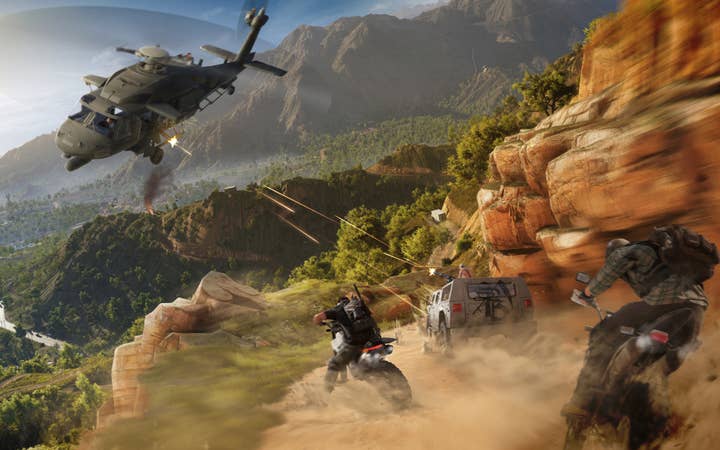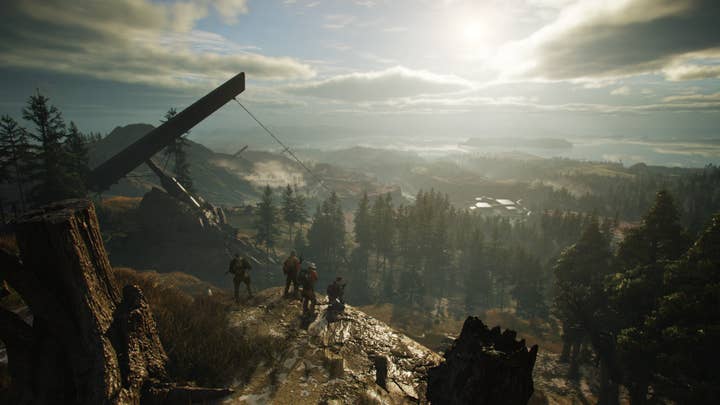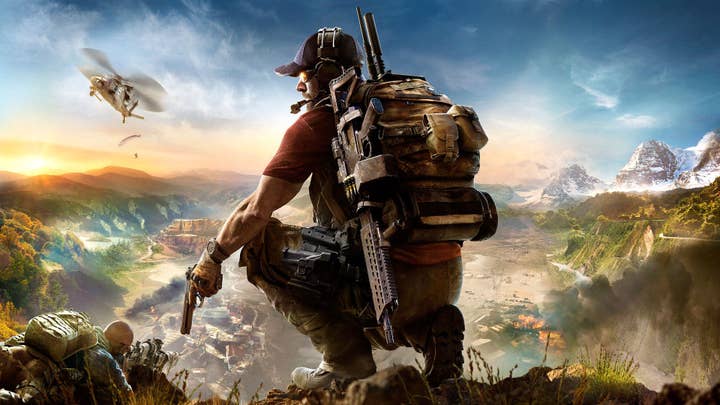What to do when Bolivia hates you
Lewis Manalo used his life experiences to write on Ghost Recon: Wildlands, and was met with the wrath of both the critics and the entire country of Bolivia
Tom Clancy's Ghost Recon Wildlands is an open-world shooter released by Ubisoft in 2017. You play as Nomad, an American special operations soldier fighting a fictional drug cartel in a fictional version of Bolivia.
During the open beta for Wildlands there was a glitch which caused Nomad to say "Shitballs!" more often than the devs had intended. It was one of Nomad's barks, but during the beta he said "Shitballs!" when he missed a shot, when he got into a jeep, when he threw a grenade, when he received help from his teammates, or even when he just turned a corner. Basically, he said "Shitballs!" for any and every reason. This issue was resolved before release, but for the 6.8 million people who played the beta, it was too late; Ghost Recon players now think of "Shitballs!" as Nomad's catchphrase.
I wrote that line.
I wrote many of the lines in Ghost Recon: Wildlands, and working with the game's narrative director, Sam Strachman, I had a ball. Joining Sam, a handful of other writers, and the rest of the narrative team, we worked our butts off to deliver a world-class narrative for a AAA video game. I loved working with the team. I made friends who I'm still close with today. I was proud of what we'd done. And then the reviews came.
"I loved working with the team. I was proud of what we'd done. I made friends who I'm still close with today. And then the reviews came"
Most reviews agreed that the co-op gameplay was amazing, but when reviews bothered to mention the writing, they savaged it. GQ said the "overcooked writing does the serious themes a disservice," and noted that the heroes were "unlikeable morons invading a foreign country without a formal declaration of war." Gamespot wrote that the "squad chatter" was "poorly-written," and that the "the narrative perpetuates the notion that a cartel is only worth taking seriously when one of your own has been tortured to death." Ars Technica summed it up as, "Terrible writing across the board."
It didn't help that Donald Trump had just been sworn in as president. It didn't set a tone that welcomed a story of American interventionism. Eurogamer wrote, "Ghost Recon: Wildlands' premise reads like a 5am Trump tweet," as if no other president had ever been capable of sending troops overseas. The marketing for the game didn't help, either. The advertising sold Wildlands based on its gameplay -- the obvious strategy for a military shooter -- but all that showed people was a group of American operators travelling to a foreign country and shooting brown people. Ubisoft's official stance on all its games seems to be, "We don't make political statements."
Bolivia formally complained to the French embassy about the game. The French embassy had to apologize. And it was all the writing's fault. As far as the media was concerned, the game was racist. Imperialist. American propaganda. Cliché. What did they know about Latin America? What did they even know about spec ops soldiers? Spec ops soldiers don't say "Shitballs!"

It's amusing to have your writing dismissed as uninformed, when, in fact, you have a unique knowledge of the topic. I was a combat engineer in the 82nd Airborne Division. Serving in Afghanistan in 2002 and 2003, I went on many missions with Special Forces teams. I lived with them in firebases on the Afghan border with Pakistan. Back in Fayetteville, North Carolina, I'd see them socially, at cookouts, at the gym. I'd run into them at Olive Garden. I can tell you, "Shitballs!" is the kind of thing an operator might say.
If you're in the most heavily-mined country in the world, looking at a local population who's starving to death, seeing women who've been oppressed for decades, taking rocket attacks every week but not getting permission to fire back? You'd better have a sense of humor. People in war zones tell jokes.
"It's amusing to have your writing dismissed as uninformed, when, in fact, you have a unique knowledge of the topic"
As far as what the narrative team knew about Latin America and the drug trade, Don Winslow is the man who took home the only "writer" credit for the game, and he spent six years researching the drug trade for his award-winning novel about Mexican cartels, The Power of the Dog. Personally, before I wrote for Ghost Recon, I was working in film, producing documentaries about communities living in the Amazon River Basin. I spent weeks in a Colombian jungle with a guide who'd been a cocalero. And maybe I did encounter legal coca, which, you know, people sometimes take. For the altitude.
I never said the writing and story were perfect, but it's a shame that so many reviewers dismissed the work because of their biased take on its politics. I have written reviews myself, and you usually take your lead from the marketing and PR because it's what your audience has seen, too. With a marketing campaign focused on how much people would enjoy the game, reviewers and players weren't expecting anything more than mindless fun. In most games, the mission giver is never a terrible, vengeful human being. Your enemies are never loving parents. Your allies never have political views, let alone Leftist views that your character might disagree with. And you definitely don't satirize machismo. Not in a video game.

I appreciate a good review as much as the next writer, but what the audience thinks is what matters the most. Audiences express themselves in sales, and Tom Clancy's Ghost Recon: Wildlands sold. No one thought it would sell as well as it has. It outsold amazing, better-reviewed games, becoming one of the top ten selling games of 2017. It's two years later, and the game is still selling.
I'm not going to pretend that the writing sold the game, but in blog posts, in forums, in player reviews, it seems that the more of the game a player gets through, the more likely they appreciate the writing. Many players struggle with understanding that the narrative is not the kind of apolitical, superficial narrative that they were sold. Many struggle to understand that though some characters are ridiculous and that they make jokes, the story itself is not a joke. In some Ghost Recon forums, the writing of Wildlands has become the subject of deep debate.
For example, there's quite a long thread on Steam called "Is this game supposed to be satire?" The narrative team had something to say, and though it may not be heard by all the millions of people who play the game, we have reached at least a few of them.
After my work on Ghost Recon: Wildlands, I was given the opportunity to be lead writer on Ghost Recon: Breakpoint, and with more cinematics and dialogue choices, Breakpoint will prove to be a different kind of narrative experience than that of Wildlands -- or any other game in the Ghost Recon franchise. The narrative team definitely learned some key lessons from its experience with Wildlands.
The first and best lesson? Don't underestimate your audience. Whatever others might tell them -- that the game has no politics, that it's political propaganda, or that it's just meaningless entertainment -- the players will figure it out.
Deep themes and complex character development won't be for everyone, but if you put it there, the right players will find it. They'll think about it. They'll discuss it. And if they don't, at least give them a few laughs.
Write lines like "Shitballs!"
Lewis Manalo is an award-winning writer and game developer. His work includes writing for the Ghost Recon franchise and creating the interactive novel The Spy and the Labyrinth. Find him online at www.princessrevolver.com.

